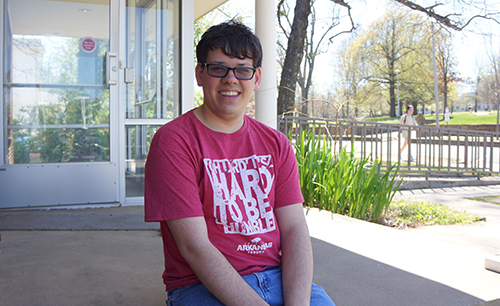
The University of Arkansas Autism Support Program will graduate its first students this year, four years after the program was established in the College of Education and Health Professions.
Andrew George of Bentonville will graduate with a bachelor's degree in communications and a minor in business. He was diagnosed with Asperger's syndrome at a young age. He said the services such as academic coaching and study hall provided by the Autism Support Program helped him improve his time management and organization.
"It has helped me because I'm not very organized," George said about benefits of the program. "I know for sure my grades wouldn't have been as good. I recommend it. The coaches are very nice and really helpful. When you come to college, you don't have your parents there, and it feels strange, especially the first few weeks, when you don't go home at the end of every day. I was a little used to it because I was in Boy Scouts, but it was different."
Aleza Greene, clinical assistant professor in the Department of Curriculum and Instruction, created the program to serve University of Arkansas students with autism. The program is open to students of all majors. It began with five students and now has 15 students, whose majors are in the J. William Fulbright College of Arts and Sciences, the College of Engineering, the Sam M. Walton College of Business and the College of Education and Health Professions.
Students apply to the program, which costs $5,000 per semester, and, if accepted, receive comprehensive services in the areas of academics, social skills and transitioning to independent adult roles. Academic coaches assist with course registration, time management, organization, and communicating successfully with instructors. Autism Speaks, a national advocacy organization, has provided funds for scholarships, and the program has also received private gift support.
Students receive 15 to 20 hours of direct contact each week with program staff, including academic coaches, mentors and the program director.
"We discovered the necessity of individualizing the coaching time for each student, and we're really good at that," Greene said. "We start with a formula of what we do for each student, but as we get to know each one and their needs, we individualize the services for each student and for each day. Different days may look very different from each other, as far as the students' needs."
Peer mentoring also has proven to be invaluable in providing enjoyable experiences for students in the program as they improve their social skills.
"The peer mentors meet both on-on-one and in groups with our students, and they do things together such as go out to dinner, play Frisbee on Old Main lawn, go to the climbing wall at the HPER," Greene said. "They get out in the world and find things on campus that students do."
Greene has also started an internship program for juniors and seniors enrolled in the Autism Support Program.
"A few of them have had summer jobs or jobs during high school, but this gives everyone a chance to have some work experience before graduation," she said. "That is important on a resume. A person who works as their supervisor can be a reference when they apply for jobs."
George worked the reception desk at the Center for Educational Access, greeting people as they entered and answering the phone. He learned about the services offered there and enjoyed helping connect people to what they needed. He is not sure what he wants to do after he graduates, but he's thinking about possible jobs that could incorporate his main interests - sports and video games.
Greene said one of the students has turned his internship into a part-time job doing computer repair, and another has been offered a summer job in a biology lab.
"What's truly amazing is that everyone I've approached on campus with this idea has been so enthusiastic about helping and finding a place for students to get these experiences," Greene said. "It is so great how the university has embraced the program and the students. Everyone wants to make it work."
Topics
Contacts
Heidi Wells, director of communications
College of Education and Health Professions
479-575-3138, heidisw@uark.edu